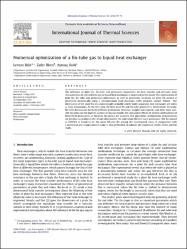Numerical optimization of a fin-tube gas to liquid heat exchanger
Özet
The influence of plate fin, fin tube and protrusion parameters on heat transfer and pressure drop characteristics of a finned tube gas to liquid heat exchanger is examined in this study. The optimization of plate fin, fin tube and protrusion dimensions as well as protrusion locations on plate fin surface is performed numerically using a computational fluid dynamics (CFD) program named "Fluent". The dimensions of the plate fin of a commercially available combi boiler apparatus heat exchanger are taken as basic dimensions. As the first step, the best plate fin and fin tube geometry is determined. Secondly, the best dimensions for three different protrusions (balcony, winglet and imprint) and their most suitable locations on the plate fin surface are found. Finally, the cumulative effects of several combinations of these three protrusions on the plate fin surface are analyzed. The placement combinations of protrusions are decided according to the results obtained for the individual effect of each protrusion. The fin named as I5B2W3 is found to be the most efficient fin among the investigated cases. A comparison with a numerical and computational study is also performed to validate the numerical results of the present study


















